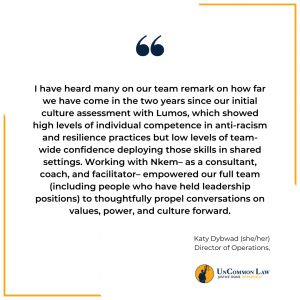
INDUSTRY: Legal
EMPLOYEES: 25 full time
THE CHALLENGE
About Uncommon Law
A legal nonprofit based in Oakland, California, UnCommon Law provides essential services to people navigating California’s discretionary parole process. These include trauma-informed legal representation, mental health counseling, legislative and policy advocacy, and in-prison programming led by those who have been through the process themselves. The organization comprises program, outreach and advocacy staff; attorneys and legal support roles; and administrative and leadership positions. About half of UnCommon Law’s 25-person staff have personal or familial lived experience with the carceral system. The pandemic transition to hybrid remote and in-person work, coupled with rapid organizational expansion, took a toll on their team—exacerbating pre-existing power dynamics, straining capacity, and impacting morale.
THE SOLUTION
An eTIRO EDIA Journey
To support their staff through these challenges, Uncommon Law embarked on an embodied trauma-informed and resilience-oriented (eTIRO) Equity, Diversity, Inclusion, and Antiracism (EDIA) journey. Lumos began this process with an organizational assessment to precisely identify strengths, areas for improvement, and gaps in the agency’s culture and structure.
Based on the assessment findings, Lumos recommended a six-part live virtual embodied capacity building training for all UnCommon Law staff. Over several weeks, the team learned conflict resolution frameworks and communication strategies to examine past harms that were impacting the current organizational culture. They gained capacity and empathic relational skills needed to address these harms and seek out repair with one another
The organization then continued its eTIRO journey by seeking comprehensive facilitation support for a multi-day in-person staff retreat in Oakland. Guided by Lumos founder Nkem Ndefo, the staff worked on personal and organizational values realignment, grounded in the shared language and embodied resilience skills staff had developed through the capacity building training. With a rehumanized leadership team, increased trust, and improved morale, UnCommon Law collectively developed a blueprint for new governance including workload and compensation adjustments for leadership team members. The new plan included implementation scaffolding that can be revised and adapted for continued organizational growth.

THE RESULTS
An Ongoing Commitment to Transformation
UnCommon Law’s commitment to its eTIRO journey has resulted in positive changes within the organization. They continue to engage Lumos in ongoing consultation, capacity building, and technical assistance on topics including conflict resolution, ethical uses of power, organizational values integration, and leadership development. UnCommon Law is demonstrating a commitment to continuing to build a culture that is grounded in shared values, so they can advance their mission of ensuring that incarcerated people have access to healing, justice, and effective legal representation.